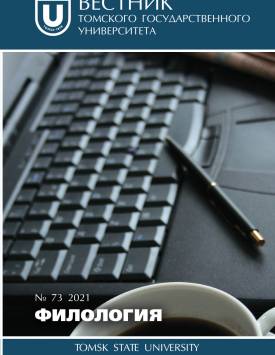“A Mirror for the Hero”, or Rufino Cuervo’s Biography in Fernando Vallejo’s novel El Cuervo Blanco
This article explores the linguistic and semiotic features of the biographical description and reflections on the role of the famous Colombian philologist Rufino Jose Cuervo Urisarri (1844-1911) in the development of modern lexicography as presented in the novel El Cuervo Blanco/The White Raven (2012) by the prominent Colombian writer Fernando Vallejo. The research offers a multimodal philological analysis of the text; discusses the factual, aesthetic, and intertextual means of the biographical novel; establishes the features of the syncretic genre of Cuervo’s biography created by Vallejo. The specific Vallejo’s idiostyle is characterised by his personal attitude, his own life experience, and numerous commentaries on the Spanish language, its norm, usage, variation, functional diversity, with multiple examples from Spanish spoken in Colombia. The chronotope of the novel settles it not to the dates of Cuervo’s life but overpasses them and extends from the Spanish language mindset up to nowadays. The research has established that, for the aesthetics of the text on the whole, the constant switching of the narrative register from objective historiographic to the artistic or colloquial one, including ethnospecific Colombian vocabulary, is proper. The article also highlights the main semiotic codes of this biographical fiction: the linguistic and historical personality of Rufino Cuervo, his professional environment, Cuervo’s masterpiece, i.e. Dictionary of Castilian Language Construction and Rection, historical and cultural context of Colombia, Vallejo’s reflections on the Spanish language in time and space, intertextuality, the ambivalent code of contrasting religion and profanity, the code of death. Facets of dialogicity of the novel arise from Cuervo’s correspondence and other kinds of documents. Citing numerous letters from Cuervo’s correspondence, from whole texts to just some fragments, the author-narrator of the novel analyses their content, style, always adding his personal human and linguistic experience. The author-narrator trends to unusual argumentative strategies due to a broad allusive and intertextual background, makes neologisms, which form an important compositional and aesthetic feature of the text. The dialogicity of the novel is being observed in the range from autocommunication to polylogue. Vallejo’s idiostyle, creative linguistic strategies and techniques allow the writer to form a unique ideological, artistic, and civic message of the fictional biography, and to highlight the outstanding personality of the Colombian philologist Rufino Cuervo, considered by the writer to be “saint”. Vallejo admires Cuervo as a person and as the author of the Dictionary of Castilian Language Construction and Rection. In the novel, Vallejo acts as a real person and the author-narrator thus creating holistic intertextual and allusive parameters of both the biographical description and the artistic space of the text of El Cuervo Blanco, which can be considered as a philosophical biography novel.
Keywords
Rufino Cuervo, Fernando Vallejo, Columbia, fictional biography, narrative, idiostyle, allusion, intertextualityAuthors
| Name | Organization | |
| Chesnokova Olga S. | Peoples’ Friendship University of Russia | tchesnokova_olga@mail.ru |
References

“A Mirror for the Hero”, or Rufino Cuervo’s Biography in Fernando Vallejo’s novel El Cuervo Blanco | Vestnik Tomskogo gosudarstvennogo universiteta. Filologiya – Tomsk State University Journal of Philology. 2021. № 73. DOI: 10.17223/19986645/73/9
